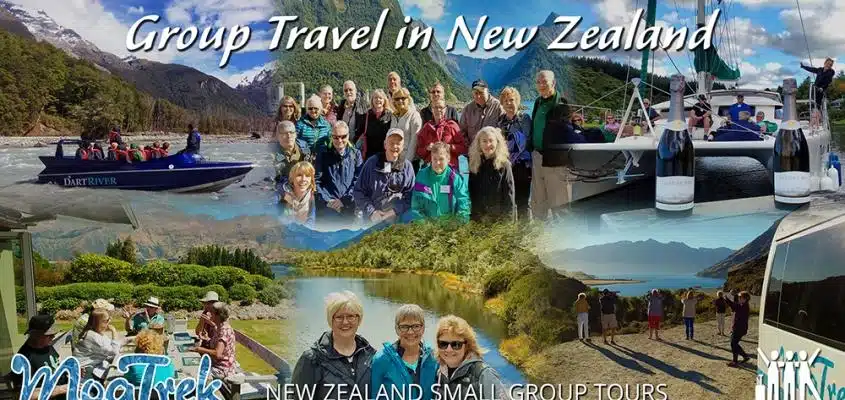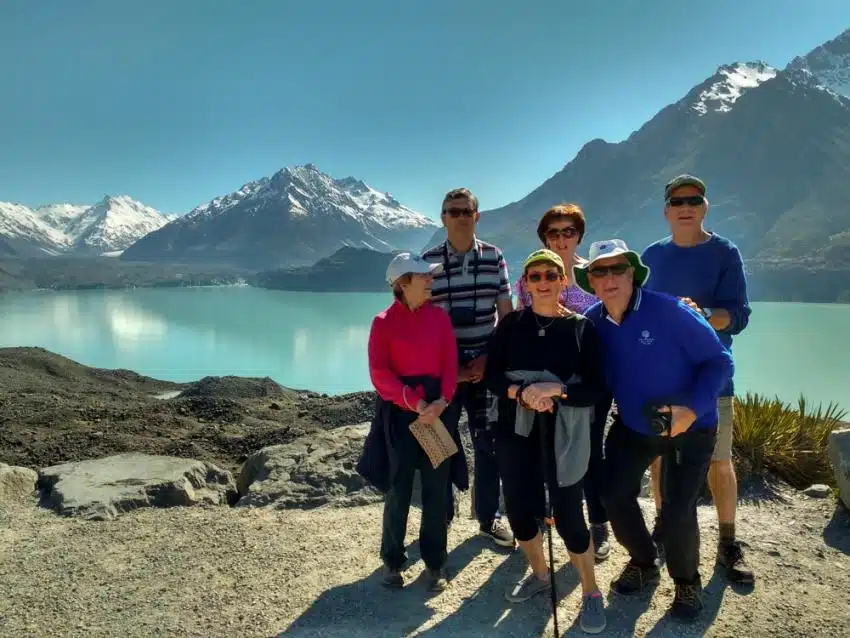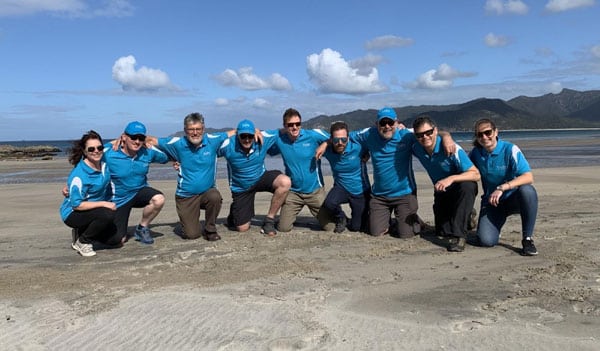Planning a trip to New Zealand and still unsure of how to see the country? Jump online and you know you’ve got choice for your trip, you can travel in a group or do your own thing. Whether you’re visiting the South, North or both islands, there’s a lot to see and do in our beautiful country and no doubt you want to find the right fit for your trip. Here’s a handy guide to group travel in New Zealand, including a comparison of group vs solo travel and some planning tips for your trip, from your friends at MoaTrek.
There are two types of people in this world: Those that travel and those that don’t. You’re reading this so we’d like to welcome you to the inspired, open-minded, and passionate tribe of world travellers.
Now, in your tribe, there are two sub-species: the solo traveller and the group traveller. Both are valid ways of travelling and you probably have your own preference. Each style of travel has its pros and cons. But if you’re considering a group tour of New Zealand, let us explain why group travel is a great way to see the country.
Despite the fact that many travellers like to do things on their own, we humans are programmed to thrive in groups. That’s often why we join clubs, societies, dance classes, and the like. In these get-togethers, like-minded individuals offer each other support and encouragement. The camaraderie really can make the experience so much more enjoyable.
In the case of group travel, simply experiencing a sunset, mountain vista, or valley landscape is often more fun with others. The solo traveller only has his or her own thoughts to share the new experience, while the group members smile together, take photos, and hug each other (this part is optional but pretty common).
Planning a group trip to New Zealand?
You don’t have to worry about the actual travel logistics. That’s all taken care of on a group travel tour. The only thing that you need to concern yourself with is bringing your toothbrush or enough pairs of underwear. Of course, you’ll need to do a bit of pre-planning to find the right trip (see below) but once that’s confirmed, let the experts do the hard work.
When your travel plans are already taken care of you can waste less time searching booking sites, TripAdvisor, and other forums to get the latest info. Instead, spend your time dreaming about the adventure coming up or bragging to our friends about the exciting things you’ll be doing.
Going with an established group tour operator means travel experts have done all the homework for you and are playing with “home field advantage”, if you like. Thanks to years in the New Zealand group tour game, we know what our guests like, and we know how to find the best experiences all over the country.
Don’t get us wrong, solo travel is great. We love it, but we’re also aware of the time it takes to find out which buses go where, what’s open and closed on public holidays, how to get from A to B without getting ripped off, and so on.
Many solo trips cost far more than a group travel tour, if not in money, in time spent planning. Companies that run group tours already have relationships with hotels, tourist attractions, activities, and restaurants. In small countries like New Zealand this can make all the difference, you try and find a room in Queenstown for mid February all on your own, it can take a long long time.
How to plan your group trip
1. First, book those flights!
This will be one of your biggest expenses so it’s worth securing the right dates at the right price. Try to match your flights up with the available dates of your preferred tour. Good tour companies will have plenty of options.
2. Learn when the best time to visit New Zealand is
Want sunshine and warm air? Summer in New Zealand runs from December to February. If you’d prefer some winter activities and snow-capped mountain vistas, head down in June, July, or August. Here’s a handy guide to the weather and climate in each part of New Zealand throughout the year.
3. Know where you’re going.
When you find a tour that sparks your imagination, research the destinations on the tour.
Although everything will be arranged for you it’s worth knowing a few details in case you have any pre-trip questions. If there’s something you’re not sure about contact the tour company. They’ll be happy to answer any questions you might have.
4. Personal time accessories
Bring any equipment or items you might need for the downtime. Every tour will have personal time for guests. This is the part of the day when the tour bus has arrived, the local sights have been seen and there’s time to relax or enjoy your own personal interests.
Bring that camera, sketchbook, fishing rod, or yoga mat. You’ll have plenty of time to pursue your own hobbies. Of course, if you want to be around your fellow travellers, just drop a few hints! Someone will always be interested in sharing time over a coffee, beer, or going for a stroll. If your plan is to try paragliding you might not have as many takers, however.
5. Don’t forget the family and friends back home!
Consider getting a mobile phone or SIM card in New Zealand for your trip. Roaming charges can be expensive so a local SIM is the best option to save you some dollars. Send an email to the tour organiser and ask for their recommendations on the best SIM card and where to get one when you arrive.
You can then amaze/annoy/bore everyone back home with photos and messages about beautiful New Zealand.
6. Scan and print a copy of your passport.
You never know when you’ll need it. Do it before you leave so you don’t have to think about it later on.
7. Check the cancellation policy.
When booking well in advance it’s worth knowing where you stand if you have to cancel for any reason.
8. Get a second opinion.
Look around for reviews on Google, TripAdvisor, Yelp, and official tourism websites such as the New Zealand Tourism Guide for opinions and comments about tour providers. We don’t suggest relying entirely on these reviews but they will help form an opinion.
9. Contact tour companies and ask questions.
Their responses will be a good indication of how professional and helpful they are. Do they respond quickly? Are they helpful? Do you get a stock answer or a personalised response? Are they pushy or do they aggressively up-sell?
If you get a bad feeling about any company, move on to the next.
Travelling with strangers – it’s a good thing
There’s a saying, “A stranger is a friend you haven’t met yet”. We’re not quite sure who said this first, but they must have been a traveller. You’re never alone on a group tour. Meeting new people is often hard to do but there’s something about the shared experience of travelling long distances that makes people bond.
We know that when group travellers see Mitre Peak in Fiordland, Mt Cook, or the dolphins in the Bay of Islands they share the same emotions. It’s the first time for everyone. There’s something about this that breaks the ice between strangers.
We won’t deny that travelling with strangers can come with challenges from time to time. Despite the fact that for everyone holidays are a happy time, some people just don’t gel with each other. Of course, if this happens to you, discreetly mention it to the tour organizer who will do their best to manage seating arrangements.
Safety in numbers
Ever travelled alone and had the dilemma of what to do with your luggage when you need to visit the toilet in a restaurant or busy train. When you’re travelling with other people your belongings will be safe while you take care of business. You can even leave your bags behind and explore on your own if your companions agree.
There’s nothing worse than arriving at a beautiful beach with nowhere to leave your stuff while you take a dip in the ocean or lake water. At times like these it’s great to have friends to watch your back.
Travelling in numbers is always better for more serious safety concerns. New Zealand is a very safe place but in some countries, travelling alone is a risky undertaking. Even in New Zealand travelling alone for long periods has its own risks. What happens if you have an accident? Getting sick when you’re alone is not only a miserable experience but can be dangerous.
The more vulnerable members of society are often the ones that opportunists target. But nobody will try targeting people in large groups. Groups lead by local guides are even more intimidating to petty criminals.
Solo travellers who want to spend time with other people can use online forums and social media networks such as Meetup and Couchsurfing to find like-minded travel partners. However, these sites cater mostly to the young, backpacker crowd. Safety is a concern as these services are mostly self-vetted. On a tour, you know that everyone has paid for the tour and has provided personal details.
Benefits of group travel
Groups have the muscle to make things happen. Imagine arriving at a port to take a boat to some beautiful island nearby and having to wait till all seats on the boat filled up!
Organised tour groups get around this problem easily. The tour organiser arranges the transport in advance. This can be done thanks to the guarantee of passengers. You only have to jump off the bus and walk straight onto the boat.
The group’s numbers can even make boats leave, parties start, and special events occur, just by turning up.
Sometimes there’s a particular route or itinerary that uses the well-trodden path to a popular attraction. Tour groups can often change the route. This gives them the power to create customised and unique tours. In fact, if your tour is customized you might be one of the only people to experience that particular tour or event.
That’s what we call a personalised service.
Save money
Who doesn’t love a bargain? Group tour organisers pass on considerable costs savings to travellers thanks to their ability to get the best deal. It’s a win-win situation for everyone. The promoter is able to bring his event or attraction to a wider audience and the clients get a better price. Everyone is happy.
Why independent travel can be so rewarding
We’ve talked a lot about group tours but there are many reasons why solo travel or independent travel can be just as rewarding.
In our modern lives, there are often few opportunities to spice up our days outside of weekends and holidays. Most of us spend our time commuting, working, and spending precious hours at home with family or friends. There are few options to explore uncharted territory for the average person. If you’re looking for a real break from the routine, independent travel can make a trip exciting by adding a lot of chance, uncertainty, and adventure to your day.
Independent & solo travel allows you to change plans at will, explore opportunities that present themselves only in the moment, and customize plans to your exact requirements (if you have the budget).
Independent travel allows you to form friendships outside of a typical tour group structure and in many ways gets you closer to the local people. Sometimes it’s the small things that make all the difference.
Pros and cons of group travel
| Pros | Cons |
|---|---|
| Better value due to group size | Fixed schedule |
| Safer than solo travel | Cancelling or changing plans can be expensive |
| Meet new people and make new friends | Less private and intimate |
| Advice and support available instantly | Potential for personality clashes |
| Access to group only activities and sites | |
| Save time and money on planning | |
| Remove the stress of planning and driving |
Finding the best group tours in New Zealand
New Zealand welcomes over 3 million tourists a year and quite a lot of these people choose to join a tour group. Don’t make the mistake of choosing the first group tour that crosses your path. Do your research and you won’t have any regrets.
What to look for in a group tour:
1. Groups that are not too small or too large. That’s a bit vague we know but we reckon 10 would be the absolute minimum and 30 is the maximum.
Ask your tour provider about the size of the group. With smaller groups there is more room for the personal touch, better attention, and group bonding. Larger groups tend to miss out on all of the above.
2. You probably know how long you can spend on your trip but check to see if a tour suits your schedule. Check if you can extend your trip by a day or two, if required, to get the most bang for the buck. With smaller companies tours might only run every now and again and this might mean scheduling your holiday to suit the company. Here at MoaTrek we have a really comprehensive tour calendar with weekly departures through most of the season, even more at popular times so you’re bound to find something that fits perfectly with your planned vacation time
3. Budget. Find out how many types of tours each company offers. There will be different pricing for the locations visited, length of time of the trips, and activities included. If a tour company only offers one fixed type of tour then you can’t compare options. You should be able to discuss your requirements with each company to find out which tour suits you best. Don’t forget to ask for advice and recommendations. If the tour organisers are professional they will be able to advise on the best tour for you, not just the one that suits them best.
Group Tour or Independent travel – it’s all about having fun!
Sometimes planning a trip can be a bit overwhelming and it’s important to remember that you WILL have an amazing time once you’re here, regardless of whichever travel style you decide is best for you. Here’s a little inspiration for you, see all the fun we had on our trips last season:
North Island vs South Island vs all New Zealand?
This is a tricky question to answer. We love every part of the country so picking an island is like picking a favourite child. Seeing the entire country over a longer period is the best choice but we don’t expect everyone to pause life back home to spend months here (although that would be nice). How long will you have to spend down under?
New Zealand is not a big country (on a world scale). Without stopping, you could probably drive around the coasts of both islands in a week (we don’t recommend attempting this).
If time is limited, you could try a 4-day tour of the North Island. This won’t include the mountains and rainforests of the South Island but it will give you a good insight into Kiwi culture and gives you a glimpse of some beautiful parts of the country that many tourists miss.
Here’s how to pick between the two islands:
North Island
- Warmer climate
- More beach oriented options
- More Maori and Pacific Island nation culture up North
- Arguably more interesting and cosmopolitan cities. You’ll have better opportunities for sipping coffee or wine in bars and cafes in Auckland, Wellington, and Tauranga.
- Geothermal activity is concentrated on the volcanic North Island
- Rotorua gives Queenstown a run for its money in the adventure capital rankings.
- A circuit of the North Island takes a little less time than the South Island
South Island
- Whales, dolphins, seals, penguins and other wildlife are easier to see down south
- Queenstown is there
- Although the north has mountains, the real ones are down south, including Mt Cook, New Zealand’s tallest.
- If you want to stretch your legs, the South Island has more of the Great Walks. It also has more walking and hiking opportunities than the North Island.
- A wilder feel than the North Island and less crowded, although we don’t think anywhere in NZ is ‘crowded’.
Travelling with friends or family
Group travel doesn’t mean travelling exclusively with soon-to-be-friends. Old friends (or even family) travelling together can be heaps of fun. New Zealand is a great destination for a touring group of friends thanks to the language (English with a Kiwi accent), climate (not too hot or cold), infrastructure (great roads, communications, and facilities). More ‘exotic’ locations like Mexico, Indonesia, or Thailand, popular group travel destinations in their own right, can suffer from problems such as outdated infrastructure, heat, and natural disasters. We must mention that we have had a couple of natural disasters in recent years but thankfully these events are very rare.
Lose the guidebook
Guidebooks are overrated. By the time guidebooks get to print they’re out of date. Worse, any attraction or service recommended in a popular guidebook gets overrun with visitors pretty quickly. Local guides (and we mean real people) have up to the minute information on what to do and where to do it. Our local Kiwi guides live this life every day so they know how to avoid the tourist traps, skip the queues and find all the best secret spots.
There’s also something nice about receiving helpful tips and guidance on travel in a foreign land from a trusted local source. You can’t trust everything you read online but you can trust a real guide whose business depends on their credibility and integrity.
Group tour vs solo travel conclusion
There are many factors to consider when choosing your mode of travel. Each person’s circumstances will influence the decision. Age, travel experience, budget, personality, and tolerance for other people will all play a part in your final choice.
A 22-year old introvert with 5 years of solo travel experience will most likely continue travelling alone. Someone that has limited travel experience, and enjoys the company of others might feel more comfortable on a group tour.
Our table of Pros and Cons above will help you decide what is best for you. Ask your potential tour operator about the age group, status, and characteristics of typical clients on their tours. If you feel like you could be part of that group and it would enhance your experience, go for it. On our group tours we host travellers from all over the world every summer, and they love the experience of travelling in a small friendly group led by our expert Kiwi Guides. See for yourself, here’s what people say about our tours here.
The beauty of group tours is access to your own personal resource for the best tips and recommendations. This is pure gold in the form of your smiling Kiwi Guide.





